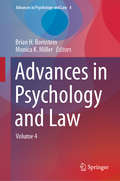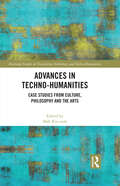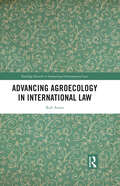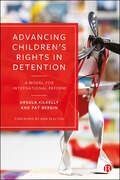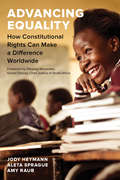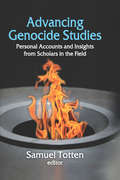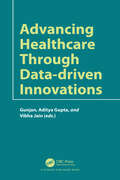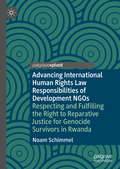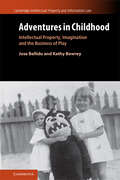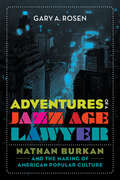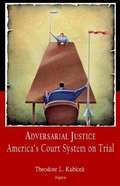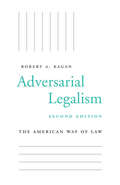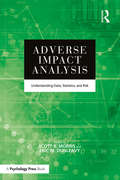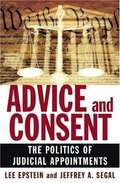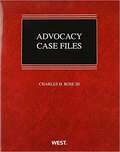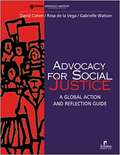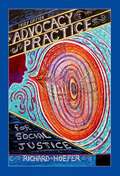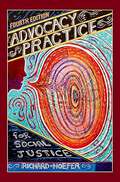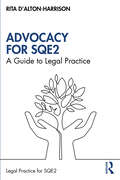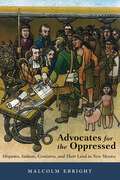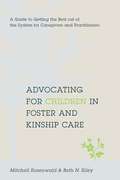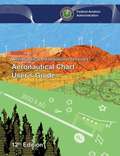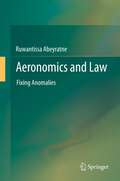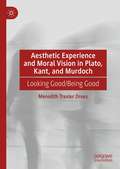- Table View
- List View
Advances in Psychology and Law: Volume 4
by Brian H. Bornstein Monica K. MillerThe present volume consists of up-to-date review articles on topics relevant to psychology and law, and will be of current interest to the field. Notably, the majority of these topics are currently attracting a great deal of research and public policy attention in the U.S. and elsewhere, as evidenced by programs at the American Psychology-Law Society and related conferences. Topics for the present volume include: attitudes toward the police (Cole et al.), alibis (Charman et al.), hate crimes based on gender and sexual orientation (Plumm & Leighton), the role of gender at trial (Livingston et al.), neuroimages in court (Glen), intimate partner violence (Mauer & Reppucci), post-identification feedback (Douglass & Smalarz) and individual differences in eyewitness identification (Snowden & Bornstein), veterans’ wellbeing (Berthelot & Prager), and plea bargaining (Levett).
Advances in Techno-Humanities: Case Studies from Culture, Philosophy and the Arts (Routledge Studies in Translation Technology and Techno-Humanities)
by Mak Kin-WahThis book is a pioneering attempt to explore the relationships between technology and the humanities through case studies and specific contexts in the areas of language, theatre, literature, translation, philosophy, music, home designations, learning environment, and artificial intelligence. Written by scholars and specialists across various fields, the chapters explore the emerging field of techno-humanities. This book examines the development of language and society by means of Big Data, how technology is integrated into the theatres of Hong Kong and the ensuing results of such integration. The authors also highlight how technology is able to analyse, understand, and visualise literary works and to bring drastic changes to translation in the past seven decades. Long-standing philosophical issues are re-examined, linkages between technology and theoretical concepts are illuminated, and the emotional aspects of computational applications are investigated. This book also delves into insightful case studies such as providing suggestions to train novice translators through corpus-assisted translation teaching, analysing patterns of housing names, and discovering a new online method to acknowledge acquisition through authentic learning experiences. Overall, this book serves as a point of departure for us to go deeper into the role of technology in transforming the humanities in this digital age. This is a useful read for students and scholars interested in learning more about the cross section between humanities and technology.
Advancing Agroecology in International Law (Routledge Research in International Environmental Law)
by Rob AmosProducing enough food is a basic human priority and a critical challenge in the face of a growing population and the deteriorating ecological health of the planet. Modern agricultural practices promise to maximise the productive efficiency of available land but are one of the main drivers of agro- and biodiversity loss. Agroecology, which places ecological sustainability and diversity at the heart of agriculture, is one response to these challenges. It presents agriculture not only as the process through which food is produced, but as a dynamic socioecological phenomenon that exists through networks comprising natural and human stakeholders at global, national and subnational levels. Drawing on a combination of agroecological and legal literature, this book explores where there is space in international law to pursue agroecology. Using a range of case studies, it demonstrates how concepts, mechanisms and regulatory approaches in the law advance, and can be reformed to further advance, an agroecological legal framework that allows humanity to meet its agricultural needs in a way that protects the natural and cultural diversity that is fundamental to the ecological integrity of the planet.
Advancing Children’s Rights in Detention: A Model for International Reform
by Ursula Kilkelly Pat BerginThe UN Global Study on Children Deprived of Liberty detailed many children’s poor experiences in detention, highlighting the urgent need for reform. Applying a child-centred model of detention that fulfils the rights of the child under the five themes of provision, protection, participation, preparation and partnership, this original book illustrates how reform can happen. Drawing on Ireland’s experience of transforming law, policy and practice, and combining theory with real-life experiences, this compelling book demonstrates how children’s rights can be implemented in detention. This important case study of reform presents a powerful argument for a progressive, rights-based approach to child detention. Worthy of international application, the book shares practical insights into how theory can be translated into practice.
Advancing Equality: How Constitutional Rights Can Make a Difference Worldwide
by Jody Heymann Aleta Sprague Amy RaubIn a world where basic human rights are under attack and discrimination is widespread, Advancing Equality reminds us of the critical role of constitutions in creating and protecting equal rights. Combining a comparative analysis of equal rights in the constitutions of all 193 United Nations member countries with inspiring stories of activism and powerful court cases from around the globe, the book traces the trends in constitution drafting over the past half century and examines how stronger protections against discrimination have transformed lives. Looking at equal rights across gender, race and ethnicity, religion, sexual orientation and gender identity, disability, social class, and migration status, the authors uncover which groups are increasingly guaranteed equal rights in constitutions, whether or not these rights on paper have been translated into practice, and which nations lag behind. Serving as a comprehensive call to action for anyone who cares about their country’s future, Advancing Equality challenges us to remember how far we all still must go for equal rights for all.
Advancing Genocide Studies: Personal Accounts and Insights from Scholars in the Field
by Samuel TottenAdvancing Genocide Studies follows in the footsteps of the editor's earlier volume, Pioneers of Genocide Studies. Here a new generation of scholars presents personal essays that reveal their motivation to study genocide, the passion that drives them to continue its study, their primary scholarly interests and efforts, and their perspective on the field as it currently stands.The contributors come from diverse backgrounds, numerous different nations and various disciplines: Kjell Anderson (The Netherlands, criminology); Yair Auron (Israel, history and education); Taner Akcam (Turkey and United States, history and sociology); Alexander Alvarez (United States, criminology); Gerry Caplan (Canada, history); Craig Etcheson (United States, international relations); Maureen Hiebert (Canada, political science); Adam Jones (Canada, political science); Henry Theriault (United States, philosophy); Samuel Totten (United States, history and political science); and Ugor Ungor (The Netherlands, history and sociology).All the contributors are well known in the field of genocide studies, and all have made important contributions to this area. Variously, they have done important theoretical work, produced new findings vis-a-vis old cases of genocide, and are pursuing new issues and topics within the field of genocide studies. Many have worked "on the ground" and bring a sense of immediacy to various crises.
Advancing Healthcare through Data-driven Innovations
by Aditya Gupta Vibha JainThe book emphasizes the role of data in driving healthcare transformation, providing readers with a roadmap for understanding and effectively implementing data-driven innovations. It delves into the applications of big data analytics, unveiling valuable insights and offering real-time decision support to healthcare professionals and goes on to review the role of machine learning and artificial intelligence in enabling accurate diagnosis, personalized treatment recommendations, and predictive modeling.The book is an invaluable resource for healthcare professionals, researchers, policymakers, and technology enthusiasts alike. Its practical insights and perspectives empower stakeholders to leverage data-driven technologies effectively, thus fostering continuous improvements in patient care and shaping a brighter future for the healthcare industry as a whole.
Advancing International Human Rights Law Responsibilities of Development NGOs: Respecting and Fulfilling the Right to Reparative Justice for Genocide Survivors in Rwanda
by Noam SchimmelThis book explores the potential responsibilities to respect, protect and fulfill international human rights law (IHRL) of a particular class of non-state actors: non-governmental organizations (NGOs). It calls for NGOs pursuing development to respect and fulfill the human right of genocide survivors to reparative justice in Rwanda. It argues that NGOs have social and moral responsibilities to respect and fulfill IHRL, and for greater accountability for them to do so. The book focuses on those NGOs advancing development in a post genocide transitional justice context acting simultaneously in partnership with state governments, as proxies and agents for these governments, and providing essential public goods and social services as part of their development remit. It defines development as a process of expanding realization of social, economic, and cultural rights addressing food security, economic empowerment/poverty reduction, healthcare, housing, education, and other fundamental human needs while integrating these alongside the expansion of freedoms and protections afforded by civil and political rights. It uses post genocide Rwanda as a case study to illustrate how respect and fulfillment of the IHRL pertaining to reparative justice are hindered by failing to hold NGOs responsible for IHRL. Consequently, this results in discrimination against, marginalization, and the disadvantaging of survivors of the Rwandan genocide against the Tutsi and violations of their human rights.
Adventures in Childhood: Intellectual Property, Imagination and the Business of Play (Cambridge Intellectual Property and Information Law #61)
by Kathy Bowrey Jose BellidoAdventures in Childhood connects modern intellectual property law and practice with a history of consumption. Structured in a loosely chronological order, the book begins with the creation of a children's literature market, a Christmas market, and moves through character merchandising, syndicated newspaper strips, film, television, and cross-industry relations, finishing in the 1970s, by which time professional identities and legal practices had stabilized. By focusing on the rise of child-targeted commercial activities, the book is able to reflect on how and why intellectual property rights became a defining feature of 20th century culture. Chapters trace the commercial empires that grew around Alice in Wonderland, Peter Rabbit, Meccano, Felix the Cat, Mickey Mouse, Peter Pan, Eagle Magazine, Davy Crockett, Mr Men, Dr Who, The Magic Roundabout and The Wombles to show how modern intellectual property merchandising was plagued with legal and moral questions that exposed the tension between exploitation and innocence.
Adventures of a Jazz Age Lawyer: Nathan Burkan and the Making of American Popular Culture
by Gary A. RosenAdventures of a Jazz Age Lawyer is the lively story of legal giant Nathan Burkan, whose career encapsulated the coming of age of the institutions, archetypes, and attitudes that define American popular culture. With a client list that included Charlie Chaplin, Al Jolson, Frank Costello, Victor Herbert, Mae West, Gloria Morgan Vanderbilt, Arnold Rothstein, and Samuel Goldwyn, Burkan was “New York’s Spotlight Lawyer” for more than three decades. He was one of the principal authors of the epochal Copyright Act of 1909 and the guiding spirit behind the American Society of Composers, Authors, and Publishers (Ascap), which provided the first practical means for songwriters to collect royalties for public performances of their works, revolutionizing the music business and the sound of popular music. While the entertainment world adapted to the disruptive technologies of recorded sound, motion pictures, and broadcasting, Burkan’s groundbreaking work laid the legal foundation for the Great American Songbook and the Golden Age of Hollywood, and it continues to influence popular culture today.Gary A. Rosen tells stories of dramatic and uproarious courtroom confrontations, scandalous escapades of the rich and famous, and momentous clashes of powerful political, economic, and cultural forces. Out of these conflicts, the United States emerged as the world’s leading exporter of creative energy. Adventures of a Jazz Age Lawyer is an engaging look at the life of Nathan Burkan, a captivating history of entertainment and intellectual property law in the early twentieth century, and a rich source of new discoveries for anyone interested in the spirit of the Jazz Age.
Adversarial Justice: America's Court System on Trial
by Theodore L. KubicekOh, those lawyers! <P><P>The legal profession in fact, the legal system certainly has a poor reputation in the United States. Proposed remedies, however, rarely go as deep as the ethics of the system. America's judicial system should not be a game that anyone can win, regardless of actual guilt or liability. Ted Kubicek, JD, describes the problems and proposes solutions. Above all, he condemns the adversary system of justice which is used to evade the truth and which makes winning the paramount goal. <P><P>Dr. Kubicek postulates that the attorney-client privilege of communication makes the truth more difficult, even impossible, to determine. The adversary system goes hand in hand with the privilege of communication since neither can exist without the other. <P><P>He advocates moving instead to an inquisitorial system, in which truth is the goal of both parties, not just of the party that would gain thereby. He then shows how the elimination of adversaryism would automatically remedy other problems endemic to the system of justice, too, such as the passiveness of trial judges and juries. <P><P>Scrapping the adversary system would abolish trial and pretrial procedures and evidentiary rules that confuse law enforcement and trial participants alike. Criminal verdicts would not then depend upon confusing evidentiary or technical matters having no connection to the guilt or innocence of the accused. <P><P>This book is intended to encourage the legal profession, the judiciary, and the organized bar to remedy America's counter-productive judicial procedures. The argument will also interest anyone who has ever had to go to trial.
Adversarial Legalism: The American Way of Law, Second Edition (California Series In Law, Politics, And Society Ser. #1)
by Robert A. KaganAmerican dispute resolution is more adversarial, compared with systems of other economically advanced countries. Americans more often rely on legal threats and lawsuits. American laws are generally more complicated and prescriptive, adjudication more costly, penalties more severe. Here, Kagan examines the origins and consequences of this system.
Adverse Impact Analysis: Understanding Data, Statistics, and Risk
by Scott B. Morris Eric M. DunleavyCompliance with federal equal employment opportunity regulations, including civil rights laws and affirmative action requirements, requires collection and analysis of data on disparities in employment outcomes, often referred to as adverse impact. While most human resources (HR) practitioners are familiar with basic adverse impact analysis, the courts and regulatory agencies are increasingly relying on more sophisticated methods to assess disparities. Employment data are often complicated, and can include a broad array of employment actions (e.g., selection, pay, promotion, termination), as well as data that span multiple protected groups, settings, and points in time. In the era of "big data," the HR analyst often has access to larger and more complex data sets relevant to employment disparities. Consequently, an informed HR practitioner needs a richer understanding of the issues and methods for conducting disparity analyses. This book brings together the diverse literature on disparity analysis, spanning work from statistics, industrial/organizational psychology, human resource management, labor economics, and law, to provide a comprehensive and integrated summary of current best practices in the field. Throughout, the description of methods is grounded in the legal context and current trends in employment litigation and the practices of federal regulatory agencies. The book provides guidance on all phases of disparity analysis, including: How to structure diverse and complex employment data for disparity analysis How to conduct both basic and advanced statistical analyses on employment outcomes related to employee selection, promotion, compensation, termination, and other employment outcomes How to interpret results in terms of both practical and statistical significance Common practical challenges and pitfalls in disparity analysis and strategies to deal with these issues
Adverse Impact Analysis: Understanding Data, Statistics, and Risk
by Scott B. Morris Eric M. DunleavyCompliance with federal equal employment opportunity regulations, including civil rights laws and affirmative action requirements, requires collection and analysis of data on disparities in employment outcomes, often referred to as adverse impact. While most human resources (HR) practitioners are familiar with basic adverse impact analysis, the courts and regulatory agencies are increasingly relying on more sophisticated methods to assess disparities. Employment data are often complicated, and can include a broad array of employment actions (e.g., selection, pay, promotion, termination), as well as data that span multiple protected groups, settings, and points in time. In the era of "big data," the HR analyst often has access to larger and more complex data sets relevant to employment disparities. Consequently, an informed HR practitioner needs a richer understanding of the issues and methods for conducting disparity analyses.This book brings together the diverse literature on disparity analysis, spanning work from statistics, industrial/organizational psychology, human resource management, labor economics, and law, to provide a comprehensive and integrated summary of current best practices in the field. Throughout, the description of methods is grounded in the legal context and current trends in employment litigation and the practices of federal regulatory agencies. The book provides guidance on all phases of disparity analysis, including: How to structure diverse and complex employment data for disparity analysis How to conduct both basic and advanced statistical analyses on employment outcomes related to employee selection, promotion, compensation, termination, and other employment outcomes How to interpret results in terms of both practical and statistical significance Common practical challenges and pitfalls in disparity analysis and strategies to deal with these issues
Advice and Consent: The Politics of Judicial Appointments
by Lee Epstein Jeffrey A. SegalFrom Louis Brandeis to Robert Bork to Clarence Thomas, the nomination of federal judges has generated intense political conflict. With the coming retirement of one or more Supreme Court Justices--and threats to filibuster lower court judges--the selection process is likely to be, once again, the center of red-hot partisan debate. In Advice and Consent, two leading legal scholars, Lee Epstein and Jeffrey A. Segal, offer a brief, illuminating Baedeker to this highly important procedure, discussing everything from constitutional background, to crucial differences in the nomination of judges and justices, to the role of the Judiciary Committee in vetting nominees. Epstein and Segal shed light on the role played by the media, by the American Bar Association, and by special interest groups (whose efforts helped defeat Judge Bork). Though it is often assumed that political clashes over nominees are a new phenomenon, the authors argue that the appointment of justices and judges has always been a highly contentious process--one largely driven by ideological and partisan concerns. The reader discovers how presidents and the senate have tried to remake the bench, ranging from FDR's controversial "court packing" scheme to the Senate's creation in 1978 of 35 new appellate and 117 district court judgeships, allowing the Democrats to shape the judiciary for years. The authors conclude with possible "reforms," from the so-called nuclear option, whereby a majority of the Senate could vote to prohibit filibusters, to the even more dramatic suggestion that Congress eliminate a judge's life tenure either by term limits or compulsory retirement. With key appointments looming on the horizon, Advice and Consent provides everything concerned citizens need to know to understand the partisan rows that surround the judicial nominating process.
Advocacy Case Files (Coursebook)
by Charles H. RoseThis text contains two real-world case files reflecting the realities of 21st Century trial practice. Designed from the ground up to challenge and develop a student's advocacy skills and analytical excellence, the text's multiple potential levels of complexity adapt easily for use with any advocacy text. The complete teacher's manual provides a thorough case analysis, suggested assignments, and outcome-driven assessments, enabling the professor to focus on teaching the law, skill, and art of advocacy.
Advocacy For Social Justice: A Global Action And Reflection Guide
by David Cohen Rosa De la Vega Gabrielle WatsonAdvocacy for Social Justice is the first guide for worldwide social and economic justice advocates. It is a direct and interactive response to the growing need for NGOs to assume new policy advocacy roles. The authors consider why it is essential to build a civil society and nurture democracy as a means of sustaining continued mainstream development. Ideal for practitioners, trainers, or students of activism, the guide uses the elements of advocacy and expounds on current issues using comprehensive case studies.
Advocacy Practice For Social Justice
by Richard HoeferCurrent economic and social forces are creating a society with less equality, justice and opportunity for all but the privileged few. Social workers are called upon by their code of ethics to counteract these trends and actively work to achieve social justice. Hoefer's empirically-based,step-by-step approach demonstrates how to integrate advocacy for social justice into everyday social work practice. The book shows through anecdotes, case studies, examples, and the author's own personal experiences, exactly how advocacy can be conducted with successful outcomes. Each chapter builds upon the previous to provide a concise yet detailed blueprint for conducting successful advocacy. The previous two editions of this book have been used and admired by professors and students alike. Students value its clarity and praise the book for opening their eyes to what they often believed was "the scary and bad" world of politics and policy. After reading the book, they are motivated to become advocates for social justice because they understand how to do so. If you want to empower your students to effect changes in laws, regulations, and other types of policy at all levels, you will find this text the perfect resource to do so.
Advocacy Practice for Social Justice
by Richard HoeferSince the publication of its first edition in 2005, Advocacy Practice for Social Justice has served as a clear, comprehensive, and practical resource for social work courses in advocacy, community practice, and macro practice. Now in its fourth edition, this text provides extensive information on the value base for advocacy; an examination of why people get involved in advocacy; and step-by-step instructions for social workers and others who want to impact laws, regulations, and policies at any level. Bearing in mind the National Association of Social Workers' Code of Ethics' requirements to advocate on behalf of vulnerable populations, readers learn that advocacy is a problem-solving technique similar to that used in social work practice of all types. The book moves through the stages of advocacy: getting involved; understanding the issue; planning; advocating through education, persuasion, and negotiation; presenting information effectively; monitoring and evaluating results; and integrating advocacy into a social worker's everyday practice. The fourth edition's inclusion of new topics and solid foundation in social work values make it a must-read as social work students and practitioners work diligently to maintain the profession's focus on successful advocacy for social justice.
Advocacy for SQE2: A Guide to Legal Practice (Legal Practice for SQE2)
by Rita D'Alton-HarrisonAdvocacy for SQE2: A Guide to Legal Practice is the first in a new series of books aimed at those preparing for SQE2, providing a comprehensive overview of everything you need to successfully pass the SQE2 advocacy assessment. Split into the two practice sections that candidates may be tested on – dispute resolution (civil) as well as criminal litigation – the book covers the basics of court procedure in both areas, so that you fully understand the role, duties and responsibilities of an advocate. In line with the requirements of SQE2, it also tests the competency skills required of an advocate in legal practice such as planning and organisation, drafting, legal research, presenting a reasoned argument, witness handling, observation, exercising judgment and the application of knowledge and decision-making. It also includes a range of supporting features, including: In Summary sections Key Practice Cases Practice Tips Practice Risks Problem Based Exercises Realistic Case Scenarios Self-Reflection Checklist Further supporting materials are also provided on the companion website. Written by an author with practice experience and early involvement in the planning and development of the SQE itself, this unique book will be essential reading for any candidate wishing to be fully prepared for their SQE2 advocacy assessment.
Advocates for the Oppressed: Hispanos, Indians, Genízaros, and Their Land in New Mexico
by Malcolm EbrightStruggles over land and water have determined much of New Mexico&’s long history. The outcome of such disputes, especially in colonial times, often depended on which party had a strong advocate to argue a case before a local tribunal or on appeal. This book is partly about the advocates who represented the parties to these disputes, but it is most of all about the Hispanos, Indians, and Genízaros (Hispanicized nomadic Indians) themselves and the land they lived on and fought for.Having written about Hispano land grants and Pueblo Indian grants separately, Malcolm Ebright now brings these narratives together for the first time, reconnecting them and resurrecting lost histories. He emphasizes the success that advocates for Indians, Genízaros, and Hispanos have had in achieving justice for marginalized people through the return of lost lands and by reestablishing the right to use those lands for traditional purposes.
Advocating for Children in Foster and Kinship Care: A Guide to Getting the Best out of the System for Caregivers and Practitioners
by Mitchell Rosenwald Beth RileyThis book is the first to provide strategies for effective advocacy and placement within the foster care and kinship care systems. It also takes a rare look at the dynamics of the foster and kinship relationship, not just among children and the agency workers and service providers who intervene on their behalf, but also between children and those who take in and care for them as permanency develops. Drawing on their experience interacting with and writing about the institution of foster care, Mitchell Rosenwald and Beth N. Riley have composed a unique text that helps practitioners, foster parents, and relative caregivers realize successful transitions for youth, especially considering the traumas these children may suffer both before and after placement.Advocating for a child's best interests must begin early and remain consistent throughout assignment and adjustment. For practitioners, Rosenwald and Riley emphasize the best techniques for assessing a family's capabilities and for guiding families through the challenges of foster care. Part one details the steps potential foster parents and kinship caregivers must take, with the assistance of practitioners, to prepare themselves for placement. Part two describes tactics for successful advocacy within the court system, social service agencies, schools, and the medical and mental health establishments. Part three describes how to lobby for change at the agency and legislative levels, as well as within a given community. The authors illustrate recommendations through real-life scenarios and devote an entire chapter to brokering positive partnerships among practitioners, families, and other teams working to protect and transition children.
Aeronautical Chart User's Guide: Aeronav Products (FAA Handbooks Ser.)
by Federal Aviation AdministrationThe updated 11th edition of the Aeronautical Chart User’s Guide by the FAA is a great reference for novice pilots and professionals alike. Printed in full color with detailed examples, this book provides all the information students and pilots need to know about all the symbols and information provided on US aeronautical charts and chart navigation publications. Readers will find information on VFR charts, aeronautical chart symbols, helicopter route charts, flyway planning charts, IFR enroute charts, explanation of IFR enroute terms and symbols, Terminal Procedure Publications (TPPs), explanation of TPP terms and symbols, airspace classifications, and an airspace class table.
Aeronomics and Law: Fixing Anomalies
by Ruwantissa AbeyratneThis book embarks on a contemporary analysis of the interaction of economics and law relating to air transport, delving into the major issues that plague the industry. It shows how some of the thorny and frustrating issues could be approached sensibly. Among the issues discussed are the anomaly of exponential growth of air transport which makes airline profitability continue to be poor; the legislative impediments in most countries that preclude direct foreign investment in the industry; the confounding and muddled mess behind the economics of aircraft engine emissions; and the inexplicable reality that, although civil aviation is primarily meant to meet the needs of the people of the world, State regulators have upended the equation and given priority to national interests over the interests of the passenger. The book will be of interest to economists and lawyers alike who deal with air transport issues, and also to academics and students in the area of transportation as well as regulators and airlines.
Aesthetic Experience and Moral Vision in Plato, Kant, and Murdoch: Looking Good/Being Good
by Meredith Trexler DreesThis book addresses how Plato, Kant, and Iris Murdoch (each in different ways) view the connection aesthetic experience has to morality. While offering an examination of Iris Murdoch’s philosophy, it analyses deeply the suggestive links (as well as essential distinctions) between Plato’s and Kant’s philosophies. Meredith Trexler Drees considers not only Iris Murdoch’s concept of unselfing, but also its relationship with Kant’s view of Achtung and Plato’s view of Eros. In addition, Trexler Drees suggests an extended, and partially amended, version of Murdoch’s view, arguing that it is more compatible with a religious way of life than Murdoch herself realized. This leads to an expansion of the overall argument to include Kant’s affirmation of religion as an area of life that can be improved through Plato’s and Murdoch’s vision of how being good and being beautiful can be part of the same life-task.
